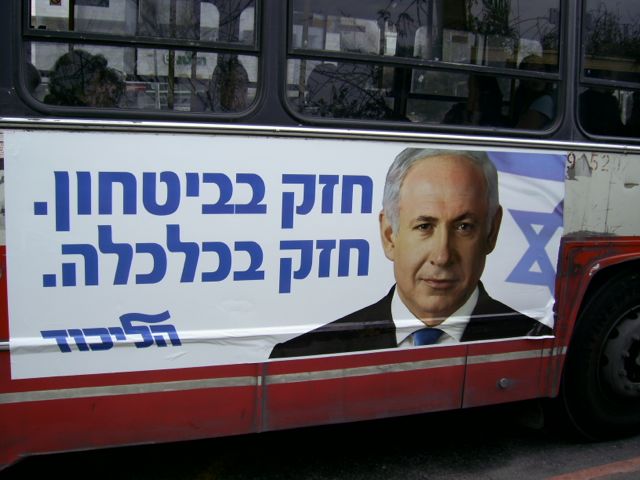The Arabs Are Coming
“Strong security. Strong economy.” A Netanyahu poster.
“The blacks are coming out in droves.”
One can only imagine the backlash a candidate running for Congress would face after making remarks like this, despite his or her intentions to motivate their base. But this is exactly what Israeli Prime Minister Benjamin Netanyahu did on election day mid-March, warning his supporters of the tide of Arab voters flooding the polls. Netanyahu has since rescinded his comments under fire from the public and the White House, but this does not negate the blatant racism and discrimination behind the Prime Minister’s words. To attempt to motivate one demographic by inciting fear of another is a clear manipulation of the principles of democracy, an issue faced both in Israel and in the United States.
Netanyahu’s bitter campaign to hold on to his position as Israel’s prime minister was, much like the campaigns of most American politicians, full of combative and condescending ads attacking Israel’s political left, including primary rival Isaac Herzog and former Minister of Justice Tzipi Livni. The race was tight; Netanyahu’s Likud Party made out with 30 seats, Herzog and Livni’s won 24, marking a 12 seat gain for Bibi and his conservative allies. It’s impossible to predict the impact that Arab voters would have had, but Netanyahu’s fears of a close election, though not unwarranted, cannot justify his scare tactics.
Fear of voter participation is not new to Israel or the United States. American politicians, particularly those on the right, often rile up their bases with accusations of voter fraud, invalidation of the votes of poorer and less educated people, and even with restrictive legislation. Voter ID laws that require voters to present government issued identification prevent people of low income from exercising their right to vote; the price to receive an ID ranges from $75 to $175, a sum that the poorest Americans cannot and should not be made to give up in order to participate in elections. In some states, people who have gone to prison or are on parole lose their right to vote, a demographic that is 38% black despite the country’s 18% black population. 5.3 million people have been denied the right to vote under felony disenfranchisement, preventing groups most affected by prison from being represented in Congress. Poll taxes, shortened voting hours, and denial of early voting all serve as obstacles to low-income and urban voters. The groups most affected by voter restriction typically vote for left-wing candidates; in 2012, President Obama won 93% of the black vote and 71% of the Hispanic vote. Voter restriction is having a stark effect on the efficacy of American democracy; the 2012 election saw an abysmal 57.5% turnout.
The fear of participation of Arab voters is just as dangerous to Israeli democracy, given the very limited representation that Arabs have in the Knesset (Israel’s equivalent of Congress), though they make up a fifth of the population. Though Netanyahu has since attempted to rescind his comments, the White House isn’t having it, referring to his comments about Arab voters as well as his insistence on the impossibility of a Palestinian state as “very troubling.”
What’s more troubling is the fact that Netanyahu would even consider attempting to garner votes through this sort of fear. His comments both invalidate the votes and opinions of underrepresented Arab voters and dehumanize them, making them the “others,” a swarm to be feared rather that a legitimate voting bloc. Though the elections are over and their effects firmly in place, the damage Netanyahu has done to his already contentious relationship with Israeli Arabs and with the US government won’t be repaired soon.
